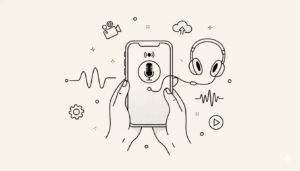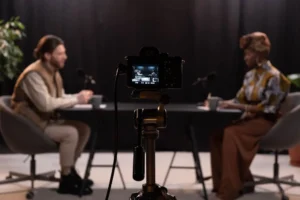Most coaches and consultants believe they need to be everywhere online, posting daily on social media, writing weekly blogs, and constantly networking, just to build authority and attract clients.
But this scattered approach creates a serious problem: your expertise gets diluted across crowded platforms where prospects scroll past without truly understanding what makes you different.
Even worse, trying to maintain this presence leads to burnout and inconsistent messaging that confuses rather than converts prospects into paying clients.
However, coaches who focus on podcasting as their primary content strategy build deeper relationships with ideal clients while establishing genuine authority in their field, often with less effort than traditional marketing requires.
In this post, we’ll cover why podcasting works specifically for coaches and consultants, the two main strategies you can use, and how to implement a podcast that converts listeners into clients. By the end, you’ll understand why scattered marketing efforts are ineffective and how podcasting can help you build a sustainable client pipeline.
Why Podcasting Outperforms Social Media for Coach Marketing
Podcasting creates a unique advantage for coaches and consultants because it demonstrates exactly what clients are buying, your ability to communicate, guide, and provide valuable insights.
When potential clients listen to your podcast, they experience your coaching style firsthand. They hear how you break down complex problems, your communication approach, and the depth of your expertise. This creates familiarity and trust that’s impossible to achieve through written content alone.
The audio format also reaches prospects during convenient moments, while commuting, exercising, or doing household tasks. This means you’re building relationships with potential clients during time they’ve already allocated, rather than competing for their attention during busy workdays.
Most importantly, podcast listeners are highly engaged. Unlike social media content that gets scrolled past, podcast listeners consume most or all of the episodes they download. This sustained attention allows you to fully demonstrate your expertise and build the relationship-based trust that’s essential for coaching and consulting sales.
The Business Case for Coaching Podcasts
Podcast listeners represent ideal coaching clients. They tend to be highly educated with above-average incomes, exactly the demographic most likely to invest in professional coaching or consulting services.
The intimacy of audio creates stronger connections than text-based content. When someone hears your voice regularly, they develop a sense of familiarity that makes them more comfortable reaching out for your services. This psychological advantage is particularly valuable for coaches, where personal connection directly impacts buying decisions.
Coaching and consulting are relationship-based businesses, and podcasts excel at relationship building. The barrier to entry is lower than ever, while the potential reach continues to grow as podcast consumption increases year over year.
The Two-Pronged Podcast Strategy That Gets Coaches Noticed
Strategy 1: Hosting Your Own Show
Hosting your own podcast provides complete control over content and messaging while building a long-term audience asset. You position yourself as the authority figure, and the benefits compound over time as your episode library grows.
This approach requires more time investment and technical setup, but creates ongoing value that works for your business even when you’re not actively promoting it. Each episode becomes a piece of evergreen content that can attract clients months or years after publication.
Strategy 2: Guest Podcasting on Established Shows
Guest podcasting leverages existing audiences for immediate visibility without requiring technical knowledge or production time. Host endorsements provide third-party credibility that’s often more powerful than self-promotion.
This strategy creates backlinks and referral traffic to your website while allowing you to test different messaging approaches across various audiences. Most coaches find success implementing guest podcasting alongside hosting their own show for maximum impact.
How to Launch Your Coaching Podcast with Castos
Start by choosing your podcast focus based on your specific coaching niche. Rather than trying to appeal to everyone, narrow your focus to the exact problems you solve best. This specificity attracts higher-quality prospects who are more likely to become paying clients.
Select a format that showcases your coaching style. If you excel at one-on-one guidance, consider Q&A episodes addressing listener questions. If you’re strong at facilitating discussions, interview successful clients or industry experts.
Here’s where Castos becomes essential for coaching businesses: our WordPress integration lets you manage everything from your existing website while we handle the technical complexity. You get professional hosting, automatic distribution to all major platforms, and detailed analytics that show which episodes generate the most client inquiries, without the technical headaches that stop most coaches from starting.
Plus, you can start building your audience immediately with our free 14-day trial.
Create compelling initial episodes that demonstrate your expertise through specific problem-solving rather than general advice. Establish a consistent production schedule that’s sustainable, it’s better to publish bi-weekly consistently than weekly sporadically.
Podcast Content Strategies That Convert Listeners to Clients
Focus on educational content that solves specific problems your ideal clients face. Rather than surface-level tips, provide actionable frameworks that deliver immediate value while demonstrating the depth of your expertise.
Case studies that demonstrate your coaching outcomes work particularly well because they show rather than tell prospects what’s possible. Include specific challenges, your methodologies, and measurable results when client confidentiality allows.
Q&A episodes addressing common client challenges position you as the go-to expert while giving prospects insight into how you think through problems. Behind-the-scenes insights into your coaching methodology help differentiate your approach from competitors.
Interview episodes with successful clients or industry experts expand your network while providing social proof. These conversations often reveal aspects of your expertise that might not emerge in solo episodes.
Monetization Beyond Client Acquisition
While client acquisition remains the primary goal for most coaching podcasts, additional monetization streams can supplement your business revenue.
Castos Ads enables monetization through dynamic ad insertion, allowing you to monetize all of your episodes, even old ones, with zero technical setup and zero transaction fees. The system dynamically stitches brand-appropriate ads to episodes automatically.
Castos Commerce provides a native listener donation system with zero transaction fees beyond standard payment processing. This allows loyal listeners to support your content while you focus on creating value.
Hybrid podcasting through Apple Podcast Subscriptions integration lets you offer premium content, early access to episodes, or ad-free versions for paying subscribers. This creates an additional revenue stream while providing extra value to your most engaged listeners.
Integrating Your Podcast with Your Coaching Business
Use podcast content throughout your marketing ecosystem. Episode topics become email newsletter content, social media posts, and blog articles. This amplifies your podcast’s reach while maintaining consistent messaging across channels.
Create lead magnets that complement episode topics, worksheets, templates, or guides that extend the value you provide in audio form. Track which episodes generate the most client inquiries to understand what content resonates most with potential buyers.
Nurture podcast-generated leads through your existing sales funnel, but acknowledge their podcast connection. These prospects often convert faster because they already understand your approach and communication style.
Technical Considerations for Coaches New to Podcasting
Start with basic but quality equipment rather than expensive gear. A good USB microphone and quiet recording space produce professional results without significant investment.
For editing, you can either learn basic editing skills or outsource to professionals. Castos Productions provides podcast editing, production, and post-production services for creators who prefer professional assistance.
Castos’s WordPress integration simplifies your workflow by allowing content management from familiar interfaces while handling technical hosting requirements. The platform provides free podcast transcriptions in 19 languages, improving both SEO impact and accessibility.
Distribution happens automatically to major podcast directories, and detailed analytics help you understand which content performs best with your audience.
Measuring Success and Refining Your Strategy
Track both podcast metrics and business outcomes. While download numbers matter, focus more on engagement metrics like completion rates and subscriber growth. Most importantly, monitor which episodes generate client inquiries or sales conversations.
Use Castos’s robust analytics to identify your most popular content types and topics. This data helps refine your content strategy to focus on what resonates most with potential clients.
Survey new clients about how they discovered you and what content influenced their decision to work with you. This qualitative feedback often reveals insights that pure analytics miss.
Common Podcasting Mistakes Coaches Make (And How to Avoid Them)
Many coaches launch podcasts without a clear strategy, leading to these costly mistakes:
Trying to appeal to everyone: Narrow your niche instead of going broad. A podcast about “business coaching” gets lost, but “scaling service businesses from $100K to $1M” attracts the right listeners.
Inconsistent publishing: It’s better to publish bi-weekly consistently than weekly sporadically. Your audience needs to know when to expect new content.
Talking at listeners instead of with them: Use conversational language and address your listeners directly. Podcasting is intimate, leverage that advantage.
Next Steps for Coaches Ready to Start Podcasting
Begin by defining your podcast’s specific focus and ideal listener. This clarity guides every content and technical decision that follows.
Set up your technical foundation with Castos to handle hosting, distribution, and analytics while you focus on content creation. The platform’s WordPress integration and one-click distribution eliminate technical barriers that stop many coaches from starting.
Plan your first five episodes before recording anything. This preparation ensures consistency and helps you refine your messaging before going live.
Remember that podcasting success for coaches isn’t measured just in downloads, it’s measured in the quality of relationships you build and the clients those relationships generate.
Your Next Step: From Scattered Marketing to Focused Authority
The coaches winning in today’s market aren’t the ones posting everywhere, they’re the ones building deep relationships through consistent, valuable podcasting.
You now understand why scattered social media efforts fail and how podcasting creates the trust and authority that converts listeners into clients. The question isn’t whether podcasting works for coaching businesses (it does), but whether you’ll start building these relationships before your competitors do.
Ready to launch your coaching podcast?
Start your free 14-day trial with Castos today. Our WordPress integration, automatic distribution, and free transcriptions handle the technical work while you focus on what you do best…helping your clients succeed.


